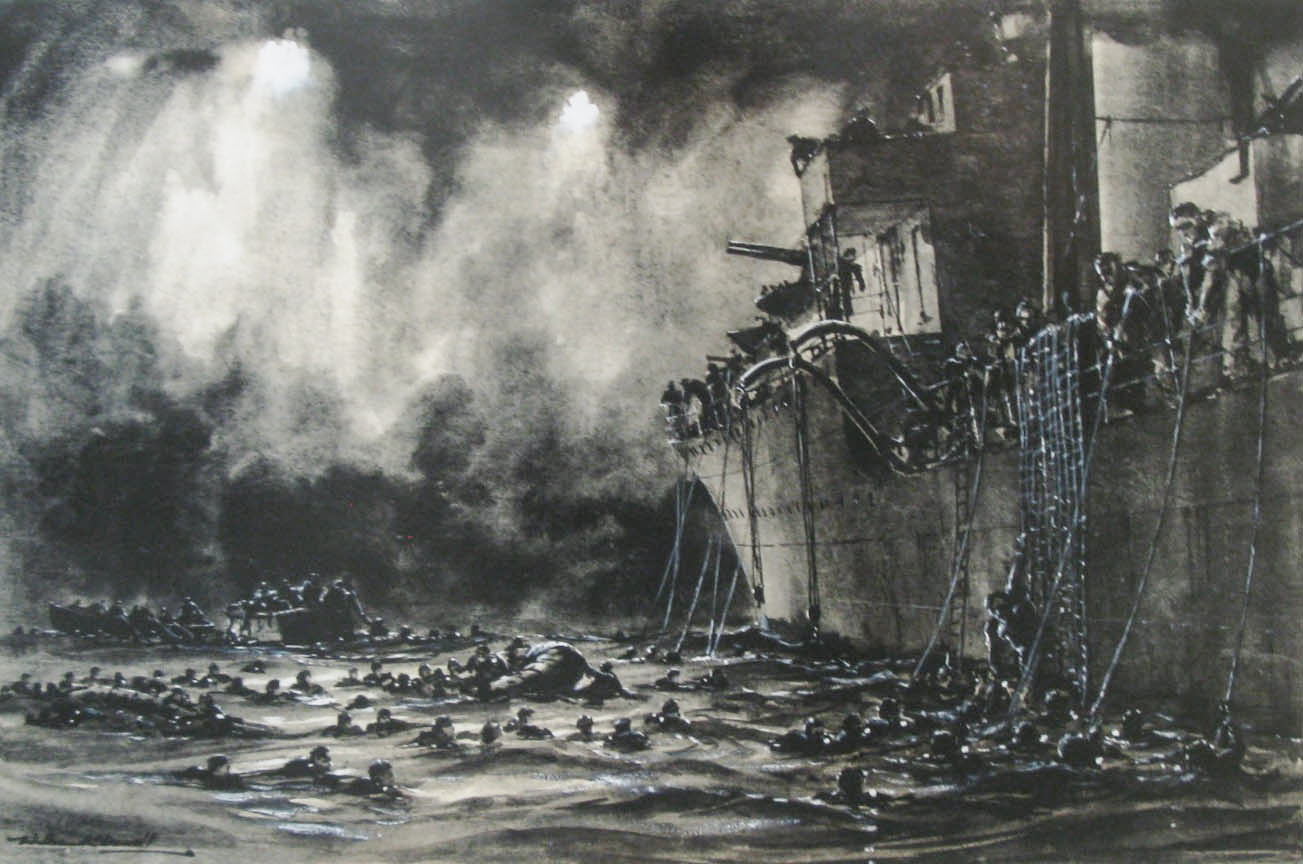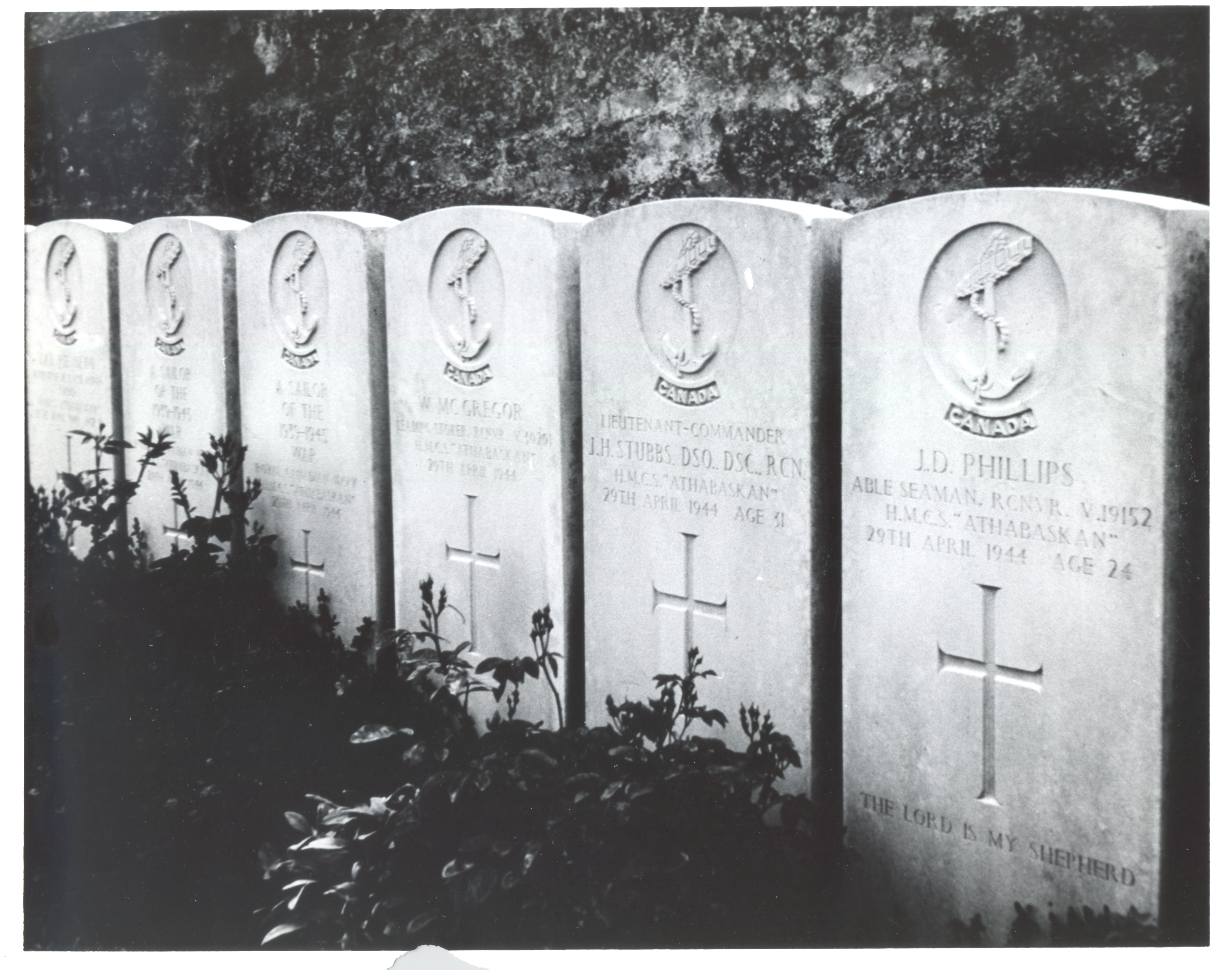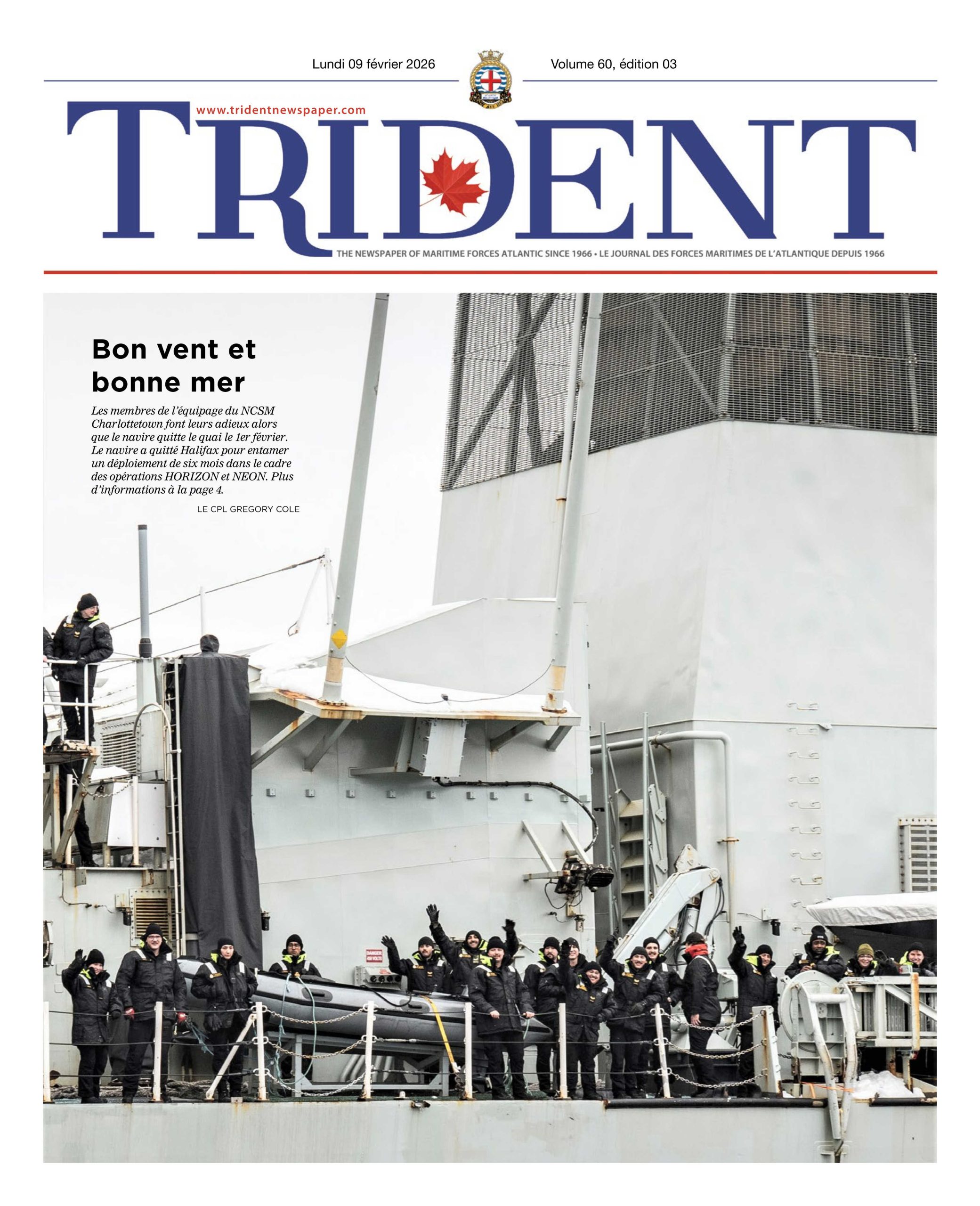
CANADIAN WAR MUSEUM
The rescue of HMCS Athabaskan: We fight as one
By CPO1 (Ret’d) Patrick Devenish,
Canadian Naval Memorial Trust
This is the second of 2 parts.
The story now entered a new phase as HMCS Haida approached cautiously and steered for the largest concentration of life jackets and floating debris. In the suddenness of the action, many of the survivors believed German destroyers were picking them up and the first few moments were a time of utter confusion. LCdr Stubbs appeared alongside a group in a Carley float with burns to his hands and face but otherwise in fair condition, stating that he was blown off the bridge shortly after the second torpedo strike. He was seen moving from group to group in the water in these first few moments as LCdr DeWolf announced Haida would remain in the area for 15 more minutes to pick up survivors. Eyewitness accounts indicated that LCdr Stubbs insisted on remaining in the water until all his crew was picked up. Finally when Haida’s 15 minutes are up, it was LCdr Stubbs from his position in the water alongside Haida who shouted “Get out of here Haida! E-boats!” In a heart-wrenching move, Haida slowly pulled away even though the surface was still littered with survivors, losing two of her own crew who were on scramble nets assisting some of the injured Athabaskans out of the water. When the tally is taken, just 45 of HMCS Athabaskan’s crew were on board Haida with the last one being dragged up a lifeline as the ship departed the area. As Haida headed north away from the Brittany coastline, she left her lifeboats and cutter with three crew aboard to continue rescue operations. At 0448, Plymouth HQ radioed that two Motor Torpedo Boats were also enroute to assist.

MUSÉE NAVAL D'HALIFAX
On Haida, Athabaskan survivors were quickly stripped of their oil soaked clothes and wrapped in blankets and Haida’s crew turned all their efforts to ensuring maximum comfort for the survivors. As Haida steadily increased the distance from Athabaskan’s sinking, full speed was rung on. Muttered one of Haida’s stokers, “We must be doing 35 knots.”
Unknown to the survivors still in the water, Haida was not returning and the order for the two MTBs to proceed to the area had been rescinded due to approaching daylight. On the water’s surface, the deepest of despair settles in and cries cursing everyone from mothers and fathers to Haida to the RCN to God himself echoed across the water. All around, lifeless bodies slipped from the grasp of others or slowly just faded into the darkness. It is the greatest irony that the first rescue craft on the scene were two German minesweepers and none other than T-24, Athabaskan’s adversary of a few hours earlier. For many in the water though, their last battle has been fought and lost from injuries, burns, exposure, or simply complete exhaustion.
On T-24, the survivors were treated surprisingly well considering the viscousness of the battles over the last few days between these foes. Hot tea and cigarettes were brought topside and in most cases survivors were permitted to shower in order to wash off oil. All their clothing was thrown overboard and the wounded weregiven blankets. T-24 continued toward Brest being strafed by two RAF Spitfires around noon, arriving at 1500 but not before two more Athabaskans succumbed to their wounds and were quietly lowered over the side.
The first Athabaskans ashore were 28 men picked up by a German Air/Sea Rescue Launch arriving alongside in Brest just after 0900. Unfortunately, one, a badly burned stoker died in his stretcher on the quay while awaiting transportation.
Meanwhile, Haida’s cutter had picked up six survivors and was heading west under the protest of the cutter’s engine, which due to inactivity led to many starts and stops. Just before being picked up by British Air/Sea Rescue, the cutter was overflown by two Messerschmitt 109s, which circled but did not fire. The cutter was taken under tow into Penzance at Land’s End.
The Aftermath
In Brest, survivors were broken into small groups and most were sent to two prison camps near Bremen, Germany but not before being given the grisly task of identifying bodies washed ashore in and around Brest. Over the following days, many Athabaskans’ bodies came to rest on the shores, the largest group(59) found on the Brittany coast near Plouescat. It was this group that included the body of LCdr Stubbs. The seriously injured were sent to an Army Hospital in Orleans, France and were repatriated back to Canada when the U.S. 5. Army encircled Paris in August, liberating them.
At 0840 on April 29,1944, Haida arrived in Plymouth to a hero’s welcome. The loss of Athabaskan and the uncertainty of her survivors overshadowed any festivities and Athabaskan became another wartime statistic as the RCN’s 16. vessel lost in this, one of the last major actions in the Atlantic in the Second World War.
Epilogue
In the investigation following the sinking of Athabaskan, many questions were unanswered, remaining so to this day. The chief reason given by the Royal Navy for canceling their dispatch of two destroyers and two MTBs for rescue was the threat of German air attack. At this stage of the war, the Luftwaffe was reeling after two years of continual day and night bombing of Germany’s industrial centers. Its strength greatly depleted, it is unlikely the Luftwaffe Command would use resources to hamper a British rescue effort of dead and dying sailors.
On the other hand, Allied fighter pilots regularly swarmed over Channel ports, destroying anything flying a German flag. Through all this, Kapitanleutnant Wilhelm Meentzen and the crew of T-24 remained on station under constant threat of Allied air attack until every measure was taken to rescue all survivors. Under nothing but a personal moral obligation, Meentzen’s sense of compassion forced him to continue. There can be no doubt as to the fate of the 87 survivors he picked up had he not chosen the course he did.
The story of Athabaskan’s demise is one of many in the annals of our wartime history.
Battle Honours:
Bay of Biscay-1943
Arctic-1943-44
English Channel-1944
Remember what these and the Battle Honours bestowed upon each of our Fleet’s ships and the people who sailed them during those darkest days mean.






